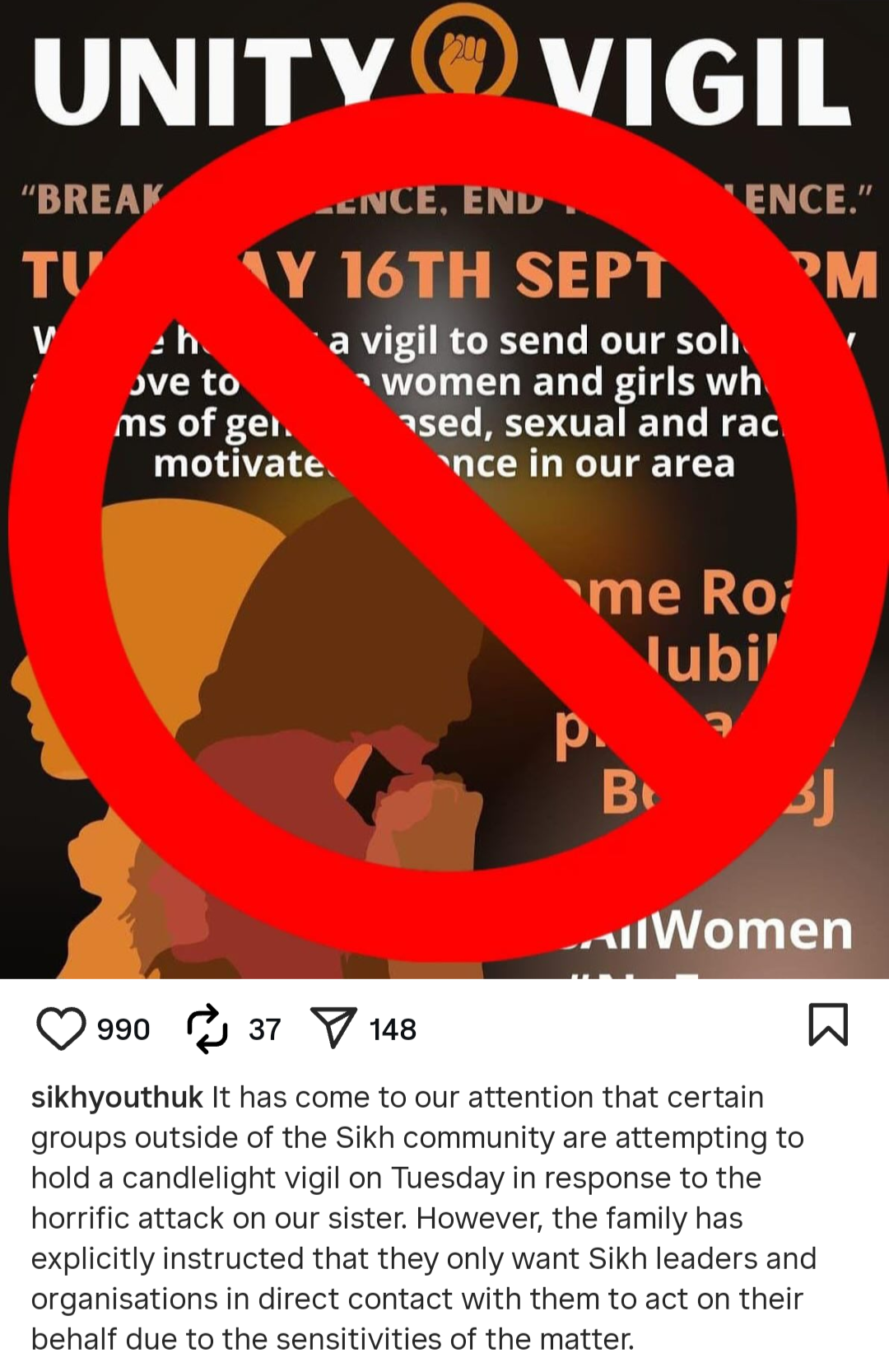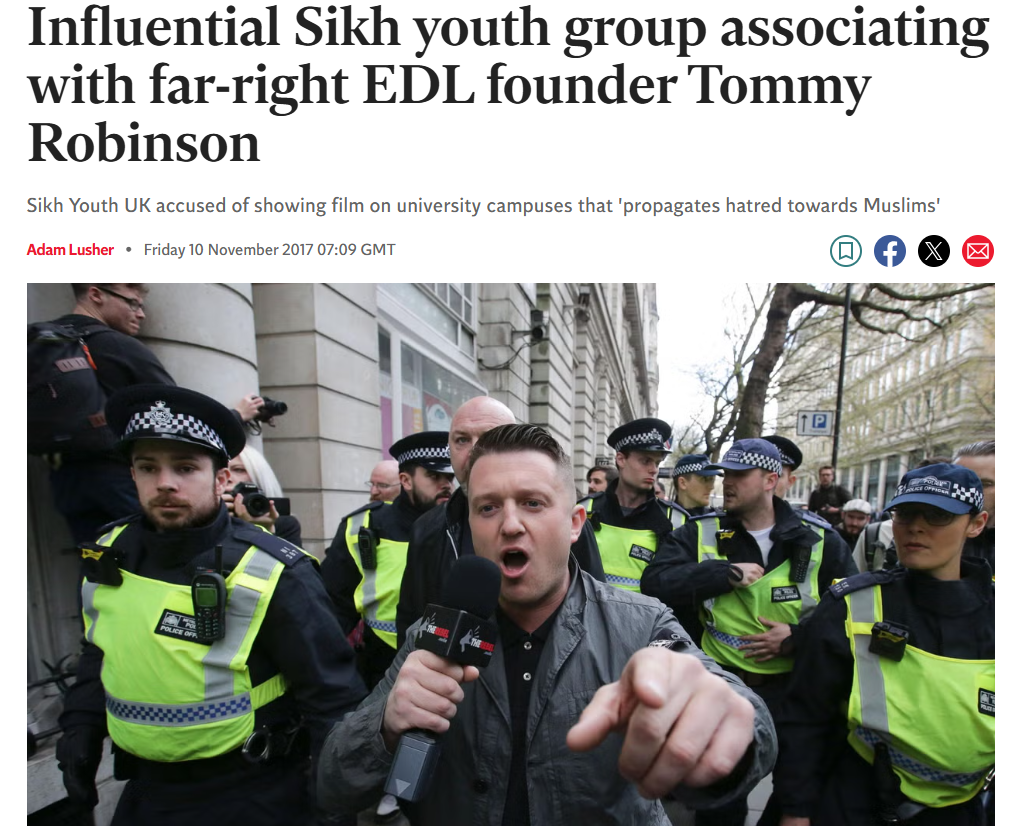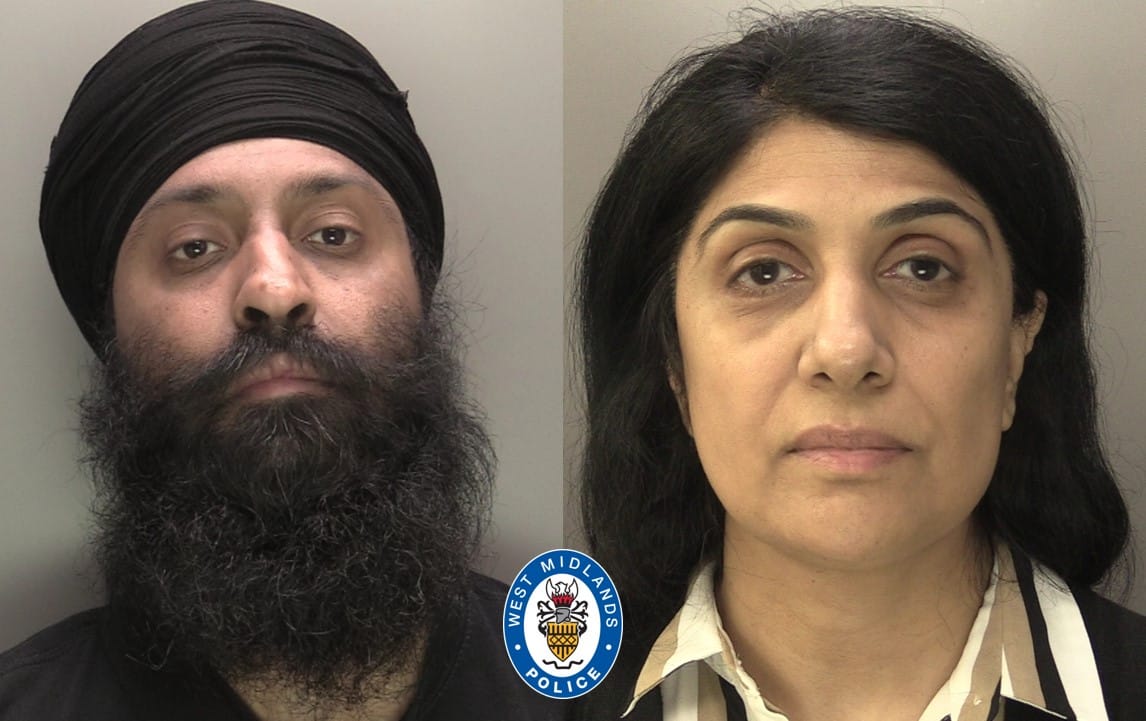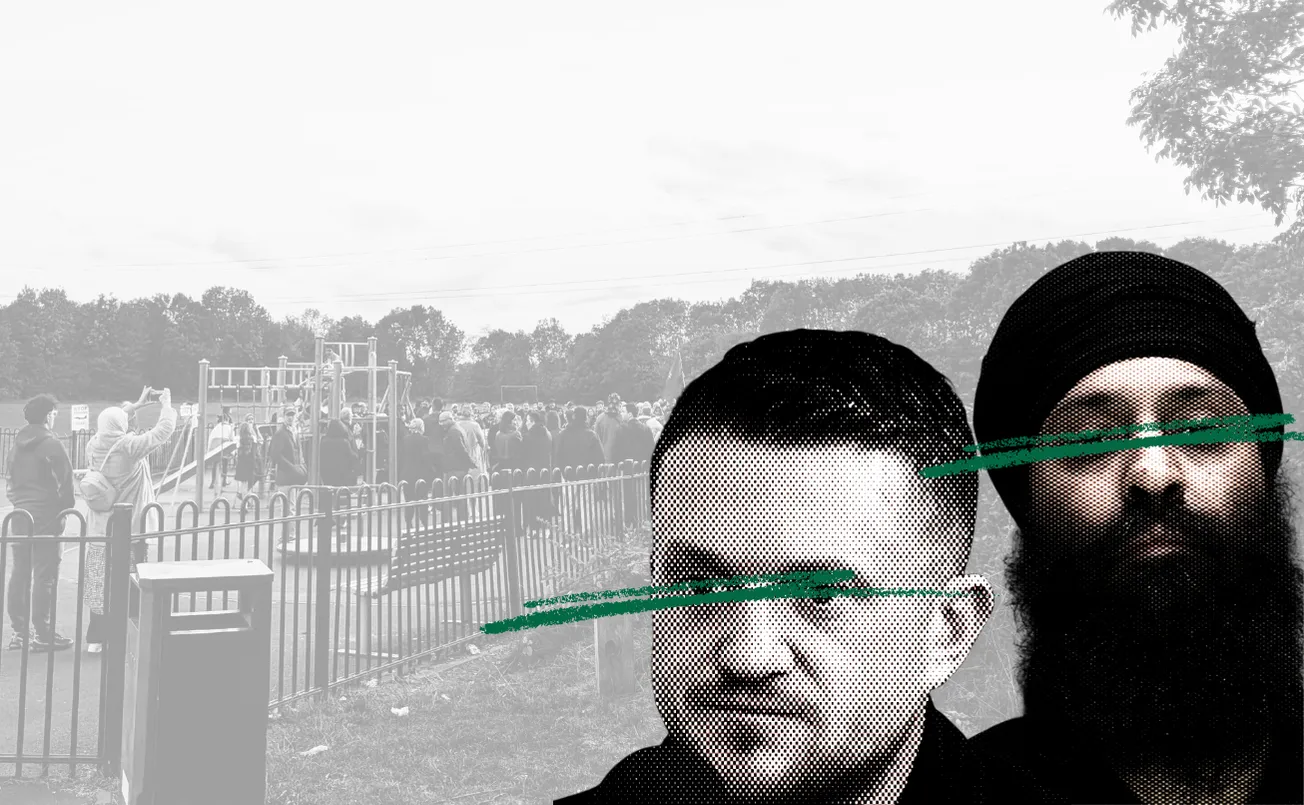It’s early Tuesday evening in Smethwick and Surinder Kaur of the Indian Workers’ Association is making a speech. “We must not allow the pain of this woman to weaponise further hate,” she intones and the crowd of around 250 people dutifully claps. Some hold placards, others film on their phones.
The audience is a snapshot of Black Country diversity: young and old, black and white. Everyone is turned out to support a young Sikh woman who, last week, reported a brutal sexual assault in Oldbury. She told the police that a racist remark was made to her during the rape. The police, who believe it was a racially aggravated attack, are searching for two white men. One man has been arrested and released on bail.
Believe it or not, this vigil, organised by local women's organisations, is a controversial gathering. Two days earlier, on Sunday, a different assembly and march took place on the streets of Smethwick. One video on social media shows a large number of men striding over a white roundabout daubed with a red St George’s cross and chanting for “justice”. In another, a crowd including older men, women and children are gathered in the rain listening to a man in a turban speak into a microphone: “Unless you have something to support our community, then stay out of it,” he says. It's unclear who exactly the protesters are affiliated with, but both videos were posted on the Sikh Youth UK Instagram page.
Although both Sunday and Tuesday’s gatherings were called to show support for the same victim, they represent a polarisation within the Smethwick Sikh community.
Sikh Youth UK is a national organisation based in Smethwick whose voice has been front and centre in the wake of the rape. But the group hasn’t responded positively to alternative community efforts, urging social media followers to “boycott” Tuesday’s vigil.
Posting on Instagram before the event, they said: “the family of the victim has explicitly instructed that they only want Sikh leaders and organisations in direct contact to act on their behalf”. They claimed those behind Tuesday’s vigil were “hijacking this horrific incident for their own purposes, using Sikhs as pawns in their political battles”.

For this reason, the organisers of Tuesday’s vigil almost called it off. However, as one of them — a non-Sikh woman called Tracy Abrahams — told me, they wanted to “widen it out, to show solidarity with the victim and speak out about all violence against women and girls at a time of heightened racial tension.”
But there is also a growing unease among Sikhs about how Sikh Youth UK has handled its response to the incident. Some Sikhs have said they sense an increasing undercurrent of Islamophobia, fuelled by narratives around “Pakistani Muslim grooming gangs,” despite the fact that the police are searching for two white men.
“It’s straight out of the EDL or BNP playbook,” says one Sikh man, who would only speak to me anonymously. “[Sikh Youth UK] use the same rhetoric [about] Muslims taking our women.”
And for all Sikh Youth UK’s talk about the Oldbury attack being “hijacked” for “political battles,” the organisation itself has been subject to the very same accusation — and criticised for its links to the UK’s most prominent far-right activist, Tommy Robinson.
A history of ‘mutual support’
Sikh Youth UK was founded in 2016 by siblings Kaldip Singh Lehal — known as ‘Dipa’ — and Rajbinder Kaur. They are widely known among Sikh communities around the country, especially in Birmingham and the Black Country, and Southall.
Digitally, their reach isn’t particularly substantial. Despite having 60,000 followers on Instagram, engagement on posts — which cover everything from the promotion of religious youth camps to decrying mixed-faith marriages — is low. In the last week, it’s shot up, as Sikh Youth UK has taken a leading role in steering outcry about the Oldbury rape. But the organisation has old friends in increasingly high places.
Their links with Tommy Robinson date back to 2017, when the organisation ran a national campaign aimed at reducing sexual violence against Sikh women. At the centre was a film, Misused Trust, which the group screened at universities and community centres around Britain. The fictional narrative is “based on an Islamophobic fantasy which suggests that there is a coordinated campaign by Muslims to capture, coerce and convert vulnerable Sikh girls into Islam,” wrote sociologist Katy. P Sian in 2017, as the film circulated.

It found a fan in Tommy Robinson, who urged his social media followers to engage with the work, posting. He posted “Sikhs raising awareness among their community about Muslim grooming gangs”, and told interested parties where they could buy a copy of the movie. Robinson also attended a Misused Trust screening in Huddersfield, following an invite from Sikh Youth UK. There, he was photographed with Kaldip and afterwards, Robinson tweeted of the film: “Had an [sic] brilliant night in Huddersfield … Islam is targeting our children”.
“It was great to have you,” replied Sikh Youth UK’s account. “Thank you for your support.”
Outcry led Sikh Youth UK to deny an ongoing relationship with Robinson, saying they were “not in regular contact with Tommy Robinson and have no connection with any right-wing group." But 2019 research from the Commission for Countering Extremism found the organisation had met with Robinson “at least twice to discuss the issue of sexual grooming and other issues of mutual interest” and that there was “mutual support” between Robinson and Sikh Youth UK.
Questions around Sikh Youth’s UK’s links to Robinson have been raised again this week, after the political agitator found time on 12 September to post a video concerning the Oldbury attack, amid his preparations for leading the largest far-right rally to be held in modern British history the following day.
In the video, Robinson decries the assault, saying he has been in touch with people close to the victim’s family. “We all get angry about attacks that are aimed at our daughters," he says. Then, without specifying which communities he is talking about, he argues that there is a difference between the “bad scumbags that have come into this nation” and the “decent, hardworking minorities who embrace this country”. He finishes by promising, at the rally, to “speak personally of the sacrifices and the great contribution that the Sikh community has made to Great Britain.”
Before the vigils, at a public meeting on Friday at Smethwick’s Guru Nanak Gurdwara, several sources say Kaldip Singh Lehal was asked to confirm if the group had cut ties with Tommy Robinson. But before he could reply, a gurdwara convenor jumped in. The conversation should be held later, in private, he said. Four sources who were in the room corroborate that this exchange occurred. The Dispatch asked Sikh Youth UK, via the Sikh Press Association, if they were in contact with Tommy Robinson but we received no reply.
And there’s another big reason Sikh Youth UK’s prominent role in the response to the Oldbury assault is raising eyebrows: its founder was convicted this year of fraudulently using £50,000 of cash raised for the charity to pay off her own debts.
In January, Rajbinder Kaur, was found to have failed to register Sikh Youth UK as a charity back in 2016 — but continued to fundraise as if it was one. Kaur — a former bank worker — then transferred money from the organisation’s bank account into her own, using a complex network of more than 50 accounts to try and obscure the trail of cash. She was sentenced to two years and eight months in prison for six counts of theft, one of money laundering and one of providing false or misleading information to the Charity Commission. Meanwhile, her brother Kaldip received a four month sentence, suspended for 18 months, for providing false or misleading information to the Charity Commission.

In a statement issued alongside the verdict, West Midlands Police Superintendent Annie Miller said: "SYUK was clearly a means to fund her lifestyle and pay her debts off, but in the simplest of terms Kaur was stealing large amounts of money that had been donated by local people for good causes."
‘They don’t represent most of us’
Despite this, Sikh Youth UK appear to have won the trust of the Oldbury victim. On Saturday, they issued a statement on her behalf in which the survivor thanked “my family, Sikh Youth UK, who have been so supportive, the local Gurdwara committees”.
Others are less on board. “There are plenty of people within the Sikh community who disagree with their tactics,” one Sikh woman, who agrees to speak to The Dispatch on condition of anonymity, says. “They don’t represent most of us.”
Another Sikh woman — who also doesn’t want to give her name — says that a growing number of Birmingham and Black Country Sikhs are “actively looking into how to…stop them [Sikh Youth UK] interfering in issues like this.”
There are fears that Sikh Youth UK’s framing of the incident as part of a wider war on Sikh women specifically could further divide. Kirat* who attended the meeting says she was left “angry” by the discussion, which suggested the issue only concerned Sikhs and wasn’t linked to a wider wave of gendered violence.
“Saying ‘this is something that is happening to Sikh women uniquely’ is very, very dangerous,” she explains. “When you start denying the political dimensions of such targeted violence, it makes it more frightening for women of colour like me; it obscures these motivations and structures that enable that violence to take place. It’s just brushing it under the carpet.”
All of my sources express deep concern around any hint that the assault might be used to sow division, something which came up at Tuesday’s vigil.
“It's deeply troubling that individuals in our own community are using this rhetoric, while claiming to defend South Asian women,” said Surinder Kaur, addressing the crowd. “We must not allow the pain of this woman to weaponise further hate.”
Sikh Youth UK did not respond to any of The Dispatch’s questions.
*Name has been changed
19/9 addition: we have added "Black Country" to the following paragraph: Another Sikh woman — who also doesn’t want to give her name — says that a growing number of Birmingham and Black Country Sikhs are “actively looking into how to…stop them [Sikh Youth UK] interfering in issues like this.”








Comments